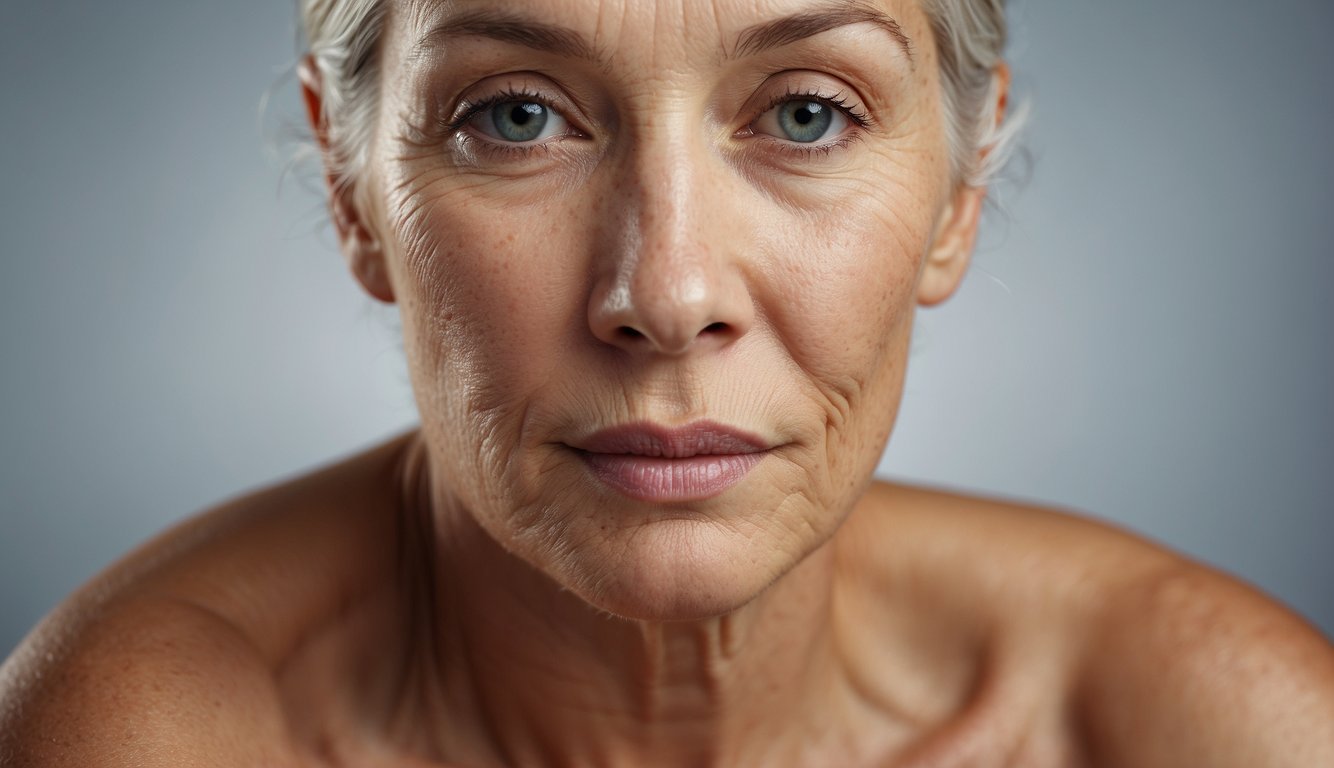Let’s explore the possibility that ageing, while a natural part of life, doesn’t have to dictate how we look or feel. What if, instead of surrendering to time, there were ways to slow it down or even undo some of its visible effects? In my journey through natural remedies, I’ve come across powerful herbs that show remarkable promise in fighting premature aging. That’s why I believe the idea behind Take Back Time: How to Reverse Premature Aging Naturally captures the essence of this journey. Just imagine looking in the mirror and seeing a fresher, more youthful you, thanks to the healing power of nature.
Understanding Ageing Prematurely
Ageing prematurely means experiencing signs of ageing before your time. It can affect both health and confidence. To understand this better, several factors contribute to this phenomenon.
Causes of Premature Ageing – Take Back Time: How to Reverse Premature Aging Naturally
Genetics plays a significant role in influencing skin elasticity and tone. In addition, environmental factors like sun exposure cause wrinkles and sunspots. Pollution can lead to oxidative stress, damaging skin cells.
Moreover, poor nutrition accelerates ageing by depriving the body of essential vitamins and minerals. Stress creates a relentless cycle of inflammation, further speeding up the ageing process. Likewise, lifestyle choices such as smoking and excessive alcohol consumption can age skin dramatically. Even lack of sleep impacts appearance, leading to dark circles and a tired look.
The Role of Lifestyle Factors
Lifestyle choices influence how we age. For instance, regular exercise keeps the body fit and boosts circulation, promoting healthier skin. A balanced diet rich in fruits and vegetables provides antioxidants necessary to fight free radicals. Additionally, staying hydrated helps maintain skin moisture and elasticity. Managing stress is crucial because it can wreak havoc on appearance. Therefore, practices like meditation and yoga can help calm the mind. Ultimately, adopting healthy habits supports youthful vitality. If I focus on these aspects, I can maintain a fresher look and feel more energetic.
The Power of Herbs – Take Back Time: How to Reverse Premature Aging Naturally
Herbs offer a natural approach to reversing premature ageing. They provide essential nutrients and antioxidants that help maintain skin vitality and overall health. Let’s take a closer look at how these green allies work their magic.
Benefits of Herbal Remedies
Herbal remedies come with numerous benefits. They enhance skin elasticity, combat inflammation, and promote cellular regeneration. Notably, many herbs contain antioxidants that fight free radicals, reducing oxidative stress. Improved circulation from some herbal teas boosts skin nourishment and gives my complexion a radiant glow. Best of all, many herbs are easy to incorporate into daily routines. Just a sprinkle here and a dash there can do wonders.
Common Herbs Known for Anti-Ageing Properties
Several herbs hold powerful anti-ageing properties. Here’s a list of some favourites:
- Green Tea: Packed with antioxidants, green tea protects skin from damage. It also supports metabolism and weight management.
- Ginseng: Known to boost energy and reduce stress, ginseng can rejuvenate my skin and combat fine lines.
- Turmeric: This bright yellow spice contains curcumin, which reduces inflammation and enhances skin clarity.
- Rosemary: It offers strong antioxidant effects and can improve blood flow. The aroma alone makes me feel youthful.
- Aloe Vera: A soothing plant, aloe vera hydrates the skin while promoting healing. It’s my go-to for sunburned skin, too.
By incorporating these herbs into my life, I create a vibrant, youthful experience. Just a few simple changes can make a noticeable difference.
How to Incorporate Herbs into Your Routine

Integrating herbs into daily life can enhance well-being and promote youthful skin. Fortunately, simple methods exist to reap their benefits.
Herbal Teas and Infusions – Take Back Time: How to Reverse Premature Aging Naturally
I enjoy sipping herbal teas each morning. For example, green tea offers antioxidants that fight ageing. Meanwhile, rosemary tea boosts circulation and enhances skin clarity. I also love making infusions with ginseng, which provide energy and resilience. To prepare, just steep the herbs in hot water for a few minutes. Straining the mixture allows for a delightful drink. Over time, regularly indulging in these brews can transform my day and overall health.
Topical Applications of Herbs
Using herbs topically brings another level of care to my routine. For instance, aloe vera gel soothes and hydrates my skin. I apply it directly for a moisture boost. Turmeric paste serves as a natural remedy for inflammation. By mixing turmeric powder with honey, I create a vibrant mask. I let it sit for 15 minutes before rinsing. Additionally, ginseng essential oil can refine my skin and reduce fine lines. I enjoy adding it to my moisturizer for extra nourishment. In short, simple applications take little time but yield fantastic results.
Scientific Research on Herbs and Ageing Prematurely
Research shows that certain herbs can help slow down the signs of ageing. In particular, studies highlight their potential benefits in promoting skin health and overall vitality.
Studies Supporting Herbal Use – Take Back Time: How to Reverse Premature Aging Naturally
Multiple studies indicate that herbs like green tea and turmeric can offer protection against oxidative stress. Green tea has antioxidants that protect cells from damage. A study published in the American Journal of Clinical Nutrition found that participants consuming green tea experienced improved skin elasticity and hydration.
Turmeric contains curcumin, a compound known for its anti-inflammatory properties. Research indicates that curcumin might help maintain skin health by reducing inflammation and promoting wound healing. Likewise, ginseng may enhance energy levels and improve cognitive function, according to a systematic review in the Journal of Ginseng Research. These benefits can contribute to an overall more youthful appearance.
Limitations and Considerations
Not every herb suits every individual. Some herbs can interact with medications. Therefore, always consult a healthcare professional before starting new herbal remedies, especially if juggling health conditions or medications. Moreover, effectiveness can vary between individuals. Ageing is a multifaceted process influenced by genetics, environment, and lifestyle. While herbs can help, a holistic approach combining diet, exercise, and stress management remains essential.
Before You Go – Take Back Time: How to Reverse Premature Aging Naturally

Embracing a holistic approach to combat premature ageing has been a game-changer for me. By integrating herbs like green tea and turmeric into my daily routine, I’ve noticed significant improvements in my skin’s vitality and overall well-being.
It’s incredible how simple lifestyle changes can lead to such vibrant results. I encourage you to explore the benefits of these herbs and find what works best for you. Remember that consistency is key, and combining these natural remedies with a balanced diet and regular exercise can truly enhance your journey toward youthful living.
As you embark on this path, don’t forget to consult with a healthcare professional to ensure you’re making safe and effective choices. Here’s to a healthier and more youthful you!
Don’t forget to add theherbprof.com homepage to your favourites so you don’t miss out on future articles!
References – Take Back Time: How to Reverse Premature Aging Naturally
Little Herb Encyclopedia, by Jack Ritchason; N.D., Woodland Publishing Incorporated, 1995
The Ultimate Healing System, Course Manual, Copyright 1985, Don Lepore
Planetary Herbology, Michael Tierra, C.A., N.D., Lotus Press, 1988
Handbook of Medicinal Herbs, by James A. Duke, Pub. CRP Second Edition 2007
The Complete Medicinal Herbal, by Penelope Ody, Published by Dorling Kindersley
Check the Following Articles
Herbal NOW Supplements, Cholesterol Pro™ with Bergamonte™
Olive Leaf Extract Benefits: A Comprehensive Overview
Naturopathic Medicine: A Guide to Natural Health Solutions
Alzheimer’s Disease: Nutrition Tips for Brain Health
Check these Categories
Frequently Asked Questions – Take Back Time: How to Reverse Premature Aging Naturally
What is premature ageing?
Premature ageing refers to experiencing signs of ageing earlier than expected, often influenced by factors like genetics, sun exposure, poor nutrition, and lifestyle choices such as smoking and excessive drinking.
How can I slow down ageing naturally?
You can slow down ageing by adopting a balanced diet rich in antioxidants, engaging in regular exercise, staying hydrated, managing stress through practices like yoga, and incorporating natural remedies like specific herbs into your routine.
What herbs are effective in combating ageing?
Key herbs that may help combat ageing include green tea, ginseng, turmeric, rosemary, and aloe vera. These herbs offer various benefits such as antioxidant protection, improved skin elasticity, and anti-inflammatory properties.
How can I incorporate herbs into my daily routine?
You can enjoy herbal teas, such as green tea or rosemary tea, use aloe vera gel for hydration, apply turmeric paste for inflammation, or try ginseng essential oil to refine skin texture for daily wellness.
Are there scientific studies supporting herbs for ageing?
Yes, scientific research supports the use of herbs like green tea and turmeric in combating ageing. Studies show that these herbs can protect against oxidative stress and improve skin elasticity and hydration.
Should I consult a doctor before using herbal remedies?
Yes, it’s important to consult a healthcare professional before starting any new herbal remedies, especially since some herbs can interact with medications or may not be suitable for everyone.
